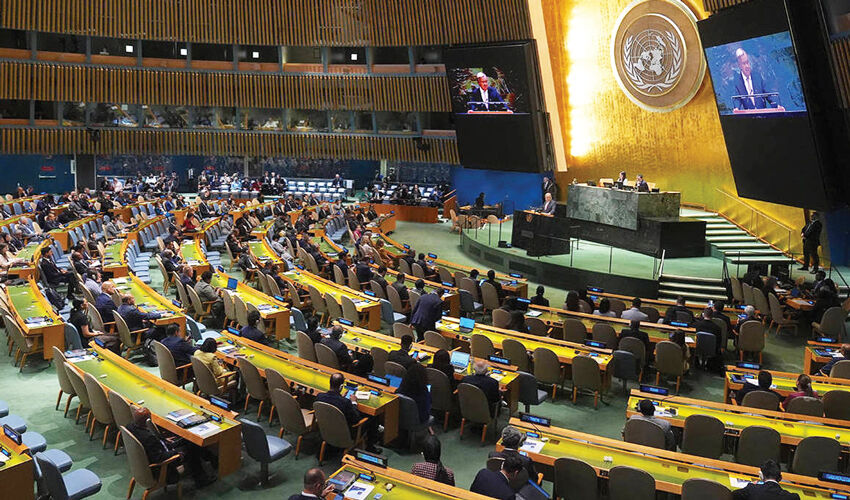
It pains me to recognize that he is largely correct about the UN’s current role in peace and security. The UN is powerless when the five permanent members of the Security Council are feuding among themselves. Russia and China veto any attempt to hold Russia accountable for a full-scale invasion of Ukraine, and the U.S. blocks collective global action to protect the Palestinians and create lasting security for Israel and nascent Palestine.
Trump, it’s true, spoke of the UN’s “tremendous capacity.” But no one should be fooled: his foreign policy is blatantly at odds with the letter and spirit of the UN Charter. He is an old-school realist who, like Russian President Vladimir Putin and Chinese President Xi Jinping, values national sovereignty and self-interest above all else. If he wants to invade other countries, or put economic pressure on them, or destroy ships in international waters for allegedly carrying illegal drugs, he will.
Of course, the U.S. has ignored the UN Charter before, engaging in proxy wars around the world during the Cold War and, most notably, invading Iraq in 2003. Nevertheless, an international order of security and economics, with rules, institutions and processes, existed to resolve global crises and often did so successfully. For all the UN’s shortcomings, a return to the balance-of-power politics of the nineteenth century, without limits on the use of force, would be far worse.
So what will be next? On the sidelines of the UNGA, many business leaders and representatives of religious groups, think tanks, educational and scientific institutions, and philanthropic organizations have gathered to discuss options for answering this question. In dozens of meetings across the city, ideas about what a new international order might look like were discussed.
Longtime advocates of UN reform see two broad possibilities for change. The first is an international order organized and led by middle powers – at the moment, essentially any country that is neither a great power nor a small state. The second option, which can coexist with the middle powers order, is a flexible, informal arrangement created by overlapping coalitions of states and non-state actors aimed at countering threats and effecting positive change at the sub-regional, regional and global levels. Think of it like the overlapping scales of an armadillo.
In the near term, as diplomats begin to follow up on the UNGA, I suggest two meetings between key countries to determine how the world can conduct diplomatic work without, or perhaps in parallel with, the US.
The first meeting should be between China, Japan, Germany, Britain, France, Italy, Canada and South Korea, which together provide nearly 50% of the total UN budget. The U.S. has long been the UN’s largest contributor; its share of the total budget for 2025 is estimated at 22%, or about $820 million. But the organization is likely to receive only a fraction of that amount, given Trump’s executive order mandating a review of U.S. funding and participation in the UN.
Thus, the eight countries should consider convening the UNGA elsewhere over the next few years, which would reduce U.S. diplomatic leverage and ensure that all delegates attend the annual session. This would also emphasize that, unlike Trump, who has made clear his disdain for “globalism,” most world governments still believe in rules that limit national sovereignty for the sake of a collective response to existential threats.
As the second largest UN sponsor, China may try to organize a UNGA in Beijing. But a more likely outcome would be to rotate the meeting between cities that host various UN and regional organizations.
The G-20 leaders, minus China, Russia and the United States, are also scheduled to meet. This group of middle powers – Britain, France, Germany, Italy, Canada, Japan, South Korea, Australia, Indonesia, India, Saudi Arabia, Turkey, South Africa, Brazil, Mexico, Argentina, the EU, and the AU – could take the steps described by Daniel D. Bradlow and Robert H. Wade to make the G20 more representative. The roughly 170 countries that are not members of the G20 may not approve of expanding its scope, but the group could increase its accountability to the global community.
As Stuart Patrick of the Carnegie Endowment for International Peace recently wrote, “the world America created will end.” Multilateral governance, however, will continue. Patrick describes a global and regional system of governance consisting of “thousands of intergovernmental organizations, treaties, consultative agreements, regional and subregional organizations, stakeholder groups, international courts and tribunals, global standard-setting bodies, and transnational networks of corporations, NGOs, experts, and subnational governments.” Whether, how and under whose leadership all these actors will be able to develop clear solutions and effective global action remains to be seen. But the game is already underway.
Anne-Marie Slaughter,
former director of policy planning at the U.S. State Department,
CEO of the New America Think Tank,
professor emeritus of politics and international relations
at Princeton University and author of the book
“Renewal: From Crisis to Transformation in Our Lives, Work, and Politics.
(Princeton University Press, 2021).
© Project Syndicate, 2025.
www.project-syndicate.org

